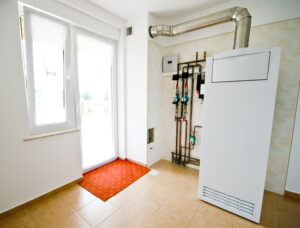If you’re new to owning a boiler—perhaps you’ve moved into a home that already has one—the idea of heating your home this way might strike you as odd. You might even worry about whether it’s dangerous. And if the boiler behaves in any way that raises a concern, you might become even more worried. What is going on with that boiler? Is it behaving normally? Does it need to be repaired? Is it going to explode? Don’t worry, we’ll explain everything.
Old-Fashioned Boilers
Many years ago, central heating systems with radiators actually used steam to heat homes. This means that they were truly boilers: they brought water to the boiling point, 212°F, in order to create steam. This did increase the risk of something going badly wrong, and yet, it was incredibly rare for them to actually explode.
Modern Boilers
Today’s heating systems do not actually boil, despite the name. They circulate hot water instead of steam, and the water is almost always between 140 and 150°F. This means they are much safer. Another major benefit of boilers is their longevity. Although you may have heard of boilers of the past surviving half a century or more, this is no longer the case. (They are also no longer quite so enormous or heavy, and are not made of cast iron.) Modern boilers can function for 30 years, which is a lot more than the typical 15 years of a gas furnace, and they also tend to require repairs less often.
Boiler Concerns
The most common reason for people to worry that their boiler is going to explode is that they are hearing an alarming sound. Sometimes, boilers make a noise which is described as “kettling,” which sounds like an enormous kettle of water boiling furiously. This is occasionally caused by the boiler overheating, but that’s not actually the reason for the sound in most cases. Instead, this sound happens when the water is percolating through a layer of sediment that has accumulated from years of mineral deposits settling out of the water in the system. If you do hear this sound, you need boiler repair in Highland Park, IL. Your technician can determine the cause, adjust the temperature if necessary, or flush the system to eliminate the sediment.
Keeping Your Boiler Safe
The best way to ensure the safety and efficacy of your boiler, and to make sure it stays in good repair throughout its lifetime, is to make sure you get annual maintenance done. This is usually scheduled for autumn, before you need to turn on the heat. This way, you’ll be sure your boiler is ready to do the hard work of keeping your home cozy through the long winter. If there are any concerns developing, they can be caught early and fixed so that they don’t turn into big problems.
Contact ServiceMax to schedule boiler maintenance or repair or ask any questions about your heating system.
